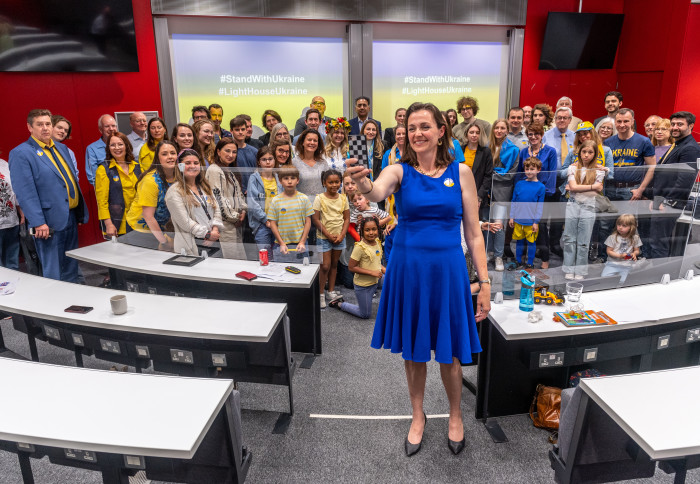Business School Dean calls for ‘peace, solidarity and action’ with Ukraine

Dr Mary Meaney (C) surrounded by speakers and guests at the LightHouse Ukraine event. Credit: Fergus Burnett
Professor Francisco Veloso highlighted the need for awareness and support of the people in Ukraine at an event hosted by the Business School.
Addressing members of the College community, their families, NGOs and industry representatives, he said: “The war has had a devastating impact on families and communities. We are here today, first and foremost because we want peace and because we want this [war] to end. The lighthouse is a sign of solidarity.”
These were the concluding remarks at the end of LightHouse Ukraine, an event that brought people together to shed light on the pressing questions about the Russian war in Ukraine and ask people to pledge their support and raise money to help those affected by the crisis.

Reflecting on the work that people within the Business School and beyond are doing to support those affected by the crisis, Professor Veloso said: “What we have heard today are great examples of people coming together in solidarity in different ways, with amazing goodwill. This event has shown that we can all make a difference in small and large ways. We can take this unfortunate situation and channel this sense of solidarity to really drive action.”
Watch the full LightHouse Ukraine event on YouTube below.
The event was organised in partnership with Alliance4Ukraine, an international organisation that aims to be a beacon of peaceful solidarity. The Imperial event was the first LightHouse Ukraine event to be hosted in London, following the success of similar events in other cities around the world.
"Crisis brings the opportunity for leaders to emerge." Celia Moore Professor of Organisational Behaviour, Business School
The audience heard the moving testimony from Andrei Kirilenko, Professor of Finance at Cambridge Judge Business School, who was born in Mariupol in the maternity hospital that was bombed by the Russians. He said: “My 85-year-old, invalid mother died there [in Mariupol] during the siege. I last spoke with her a few days into the invasion. Her mobile phone battery was dying and the power was already out and she was saying goodbye. She said ‘my life started in poverty and ends in war’.”

John Dickie, CEO of London First, the capital’s campaigning business group, gave an overview of the work the organisation is doing to provide displaced Ukrainians with jobs.
He said: “We concluded that the most effective thing that London businesses could do to help was to provide incoming Ukrainian refugees with jobs. We know just how much difference it makes when coming to a new place to re-establish life through work and there are many jobs across the economy which London business is keen to welcome Ukrainian refugees into.”
Dr Mary Meaney, a Business School Advisory Board member, shared insights of the work she’s been doing to resettle almost 400 displaced Ukrainian women and children to the community of Saint-Omer, where she lives, in Northern France. She shared moving stories of the Ukrainians she has welcomed into her community, such as Galina, a grandmother, who arrived with her daughter and eight-month-old granddaughter and 11 orphans. “A train ride from their village to the border would normally take 12 hours, but it took 54 hours because of the bombings,” said Dr Meaney.
She discussed the support the Saint-Omer community has provided to the Ukrainians, from the provision of medical care and psychological help, to education, games, art and animal therapy, adding: “For the teenagers we found that the two things that worked best were the free computers and ‘pizza therapy’ which brought smiles to these young people’s faces.”

Celia Moore, Professor of Organisational Behaviour at the Business School, described her experience of spending the weekend with Dr Meaney in Saint-Omer with one of her students, Marina Moncayola-Lobato, with a view to using Dr Meaney as a case study for her teaching on leadership.
Reflecting on the successful work Dr Meaney has achieved in her community Professor, Moore said: “Crisis brings the opportunity for leaders to emerge. What leaders do is provide routes through which goodwill and altruistic motivation can become executed into real life help.”
Article text (excluding photos or graphics) © Imperial College London.
Photos and graphics subject to third party copyright used with permission or © Imperial College London.
Reporter
Laura Singleton
Communications Division
